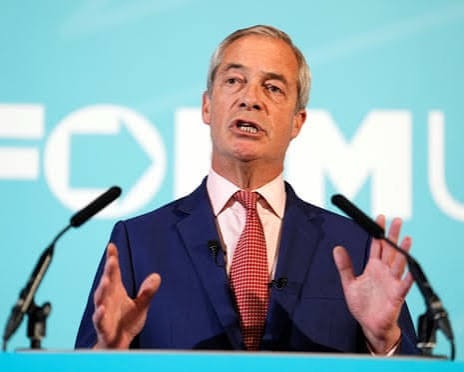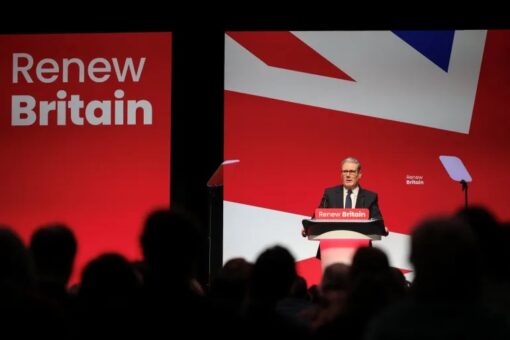The Labour conference Nigel Farage clash this week revealed far more about the weakness of the government than the strength of the opposition.
In a remarkable turn of events, the governing Labour Party, despite holding a commanding majority only 14 months after its general election victory, dedicated much of its annual gathering to attacking a politician who does not even belong to the party: Nigel Farage.
For half a century, seasoned political observers have attended conferences, but rarely has one name — belonging to an outsider — dominated proceedings so thoroughly. The message from the podium was clear: Labour fears Farage and Reform UK.
In speech after speech, ministers warned against his vision, painting it as dangerous, divisive, and even racist. But Farage, never one to shy away from confrontation, countered with equal force, accusing Labour of smearing millions of ordinary citizens and neglecting real issues facing the country.
Reform UK Policies Under Attack
The focus on Labour conference Nigel Farage rhetoric is telling. Farage argues it proves the government cannot defeat Reform UK on substance. The party’s policies, though controversial in establishment circles, resonate strongly with segments of the public.
Reform UK policies centre on deporting illegal migrants, prioritising welfare benefits for UK citizens, and ensuring foreign criminals are swiftly removed. These stances, Farage insists, are not about hate or division but about fairness and national sovereignty.
Labour ministers, however, have branded these proposals racist, immoral, and un-British.
The implication, Farage says, is that millions of Reform supporters are racist too — a charge he calls reckless, dangerous, and deeply unfair. “To accuse countless millions of being racist is a very low blow,” Farage declared, warning that such rhetoric could embolden radical groups and threaten the safety of Reform campaigners.

The Broken Britain Debate
At the heart of the Labour conference Nigel Farage row is a broader question: what is the state of Britain today? Farage’s verdict is damning.
He paints a picture of a nation in steep decline — clogged roads, overstretched hospitals, rising crime, and a justice system that appears unequal. In his words, “Britain is broken and it needs fixing.”
This message, though bleak, has traction. Many voters feel the same frustrations: waiting weeks for a GP appointment, avoiding wearing jewellery in London for fear of muggings, or watching migration numbers rise while public services struggle to cope.
Labour’s conference speeches, by contrast, offered little in terms of practical solutions. Instead, they doubled down on attacking Reform’s vision, further feeding Farage’s argument that the governing party is out of touch.
A Question of Patriotism
The Labour conference Nigel Farage confrontation also exposed a clash over identity and patriotism. Labour leader Keir Starmer suggested that Farage and his supporters do not truly love the country, accusing them of hiding behind the flag rather than improving lives. Farage, in response, argued that his entire political career has been motivated by love of Britain and the fight for sovereignty.
For him, Brexit was the ultimate expression of patriotism — a belief that Britain should govern itself free from the dictates of Brussels, foreign courts, or outdated treaties. By contrast, he accuses Starmer of trying to overturn the Brexit vote, bowing to international bodies, and failing to respect English identity. For Farage, this represents not only a difference of policy but a fundamental divergence in worldview.
Reform’s Challenge Ahead of Next May
Looking forward, Farage believes the Labour conference Nigel Farage dynamic has strengthened his party’s resolve. Reform UK is now eyeing next May’s local and devolved elections — contests he frames as Britain’s equivalent of midterms. With the whole of Wales, Scotland, London, and large swathes of England heading to the polls, Farage predicts Reform will deliver a shock to the political establishment.

He argues that the anger across communities — over immigration, crime, public services, and economic decline — will fuel a surge in Reform support. If Labour continues to dismiss these concerns and focus instead on attacking personalities, voters may turn to the alternative in unprecedented numbers. “We will teach Starmer a lesson next May that British political history will never forget,” Farage vowed
Conclusion: A Weak Labour Party, A Growing Reform
The Labour conference Nigel Farage battle has exposed the government’s vulnerability. Instead of offering new solutions to the challenges of modern Britain, Labour spent much of its conference framing Farage as the enemy. Yet by doing so, they elevated his profile, reinforced his message, and gave Reform UK a platform to contrast its policies with what Farage calls Labour’s “empty rhetoric.”
Whether or not Reform can translate polling strength into electoral success remains to be seen. But one thing is clear: Farage has once again succeeded in shaping the national conversation. And if Labour’s strategy is to demonise rather than debate, the clash between the governing party and Reform UK will only intensify — with potentially historic consequences at next May’s elections.
More news here


